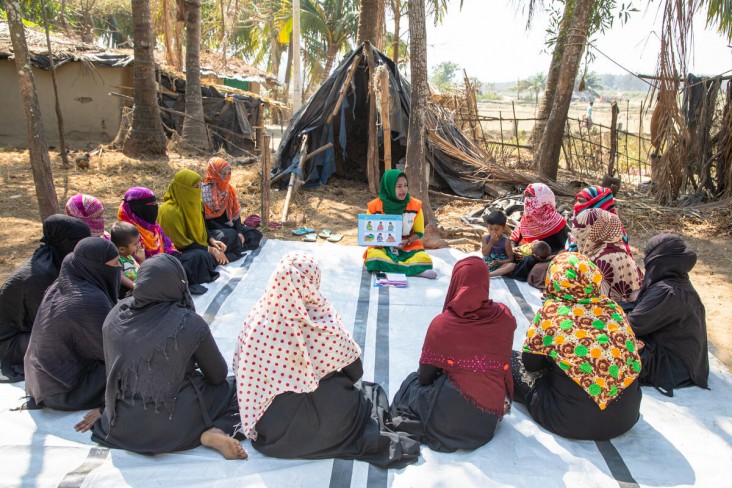Speeches Shim

Farida Begum never imagined her life could change so much, so fast. A mother of two young children from Ukhiya upazilla in southern Bangladesh, Farida, recently started her first job, working on a road rehabilitation project and earning an average monthly wage of 5,600 taka ($68) under a cash-for-work activity under USAID’s Emergency Food Security Program (EFSP), implemented by World Vision. “This is the first time I have ever earned money by working myself,” Farida said.
Farida has big plans for her hard-earned wage. “Our house is very old and could fall down from the wind. I always dreamed about having a better shelter for my children,” she said. “My husband drives a rented taxi motorcycle, but he earns very little and could not afford to pay for a better home. Now we both work and I earned enough to finally repair our home. My husband supports me working. He’s happy that I can help him manage our family expenses.”
Farida, one of 900 women enrolled in the cash-for-work program since December 2019, is eager to take steps to improve her children’s future. With income from her new job, she was able to pay monthly school fees for her seven-year-old daughter, Bulbul—something unusual in her low-income community. Her four-year-old son, Mohammad, requires medical treatment. While Farida cannot currently afford to pay for treatment, she is not giving up. “As I’m earning money now, I will get treatment for Mohammad once I save enough money.”
As one of 150 “lead mothers” in EFSP’s new community nutrition groups in Bangladesh’s Cox's Bazar District, Farida is learning about savings and money management so she can maximize savings from nine months of cash-for-work earnings. “They teach us about saving money and how to make a profit from a small business and from gardening,’’ she said.
Farida and the other lead mothers are helping mobilize more than 1,800 other women in their community to promote good family health at home.
Farida is also learning about good nutrition during the training sessions. “We are changing our food habits. Before we always ate the same kind of food, and we didn’t like to eat vegetables,” she said. “We are bringing variety in our meals, especially for our children. Traditionally, we avoided certain foods during pregnancy that we believed were not good for babies. Now we know that pregnant women should eat all kinds of vegetable, fish and meat for nutrition.’’
Farida is proud of her contribution to her family and to her community as a worker on the road repair project. She is one of 4,790 beneficiaries providing lasting support for their communities through cash-for-work projects. “I can see that my village is being developed, and so am I.’’
ABOUT THE PROGRAM: USAID’s Emergency Food Security Program (EFSP) benefits vulnerable Bangladeshi families in Cox’s Bazar. EFSP covers five unions (smallest rural government administrative unit), including Jalia Palong, Raja Palong, and Palong Khali unions in Ukhiya upazila (sub-district), and Baharchhara and Nhilla unions in Teknaf upazila. These unions are among the host community areas most heavily affected since the influx of Rohingya refugees.

Comment
Make a general inquiry or suggest an improvement.